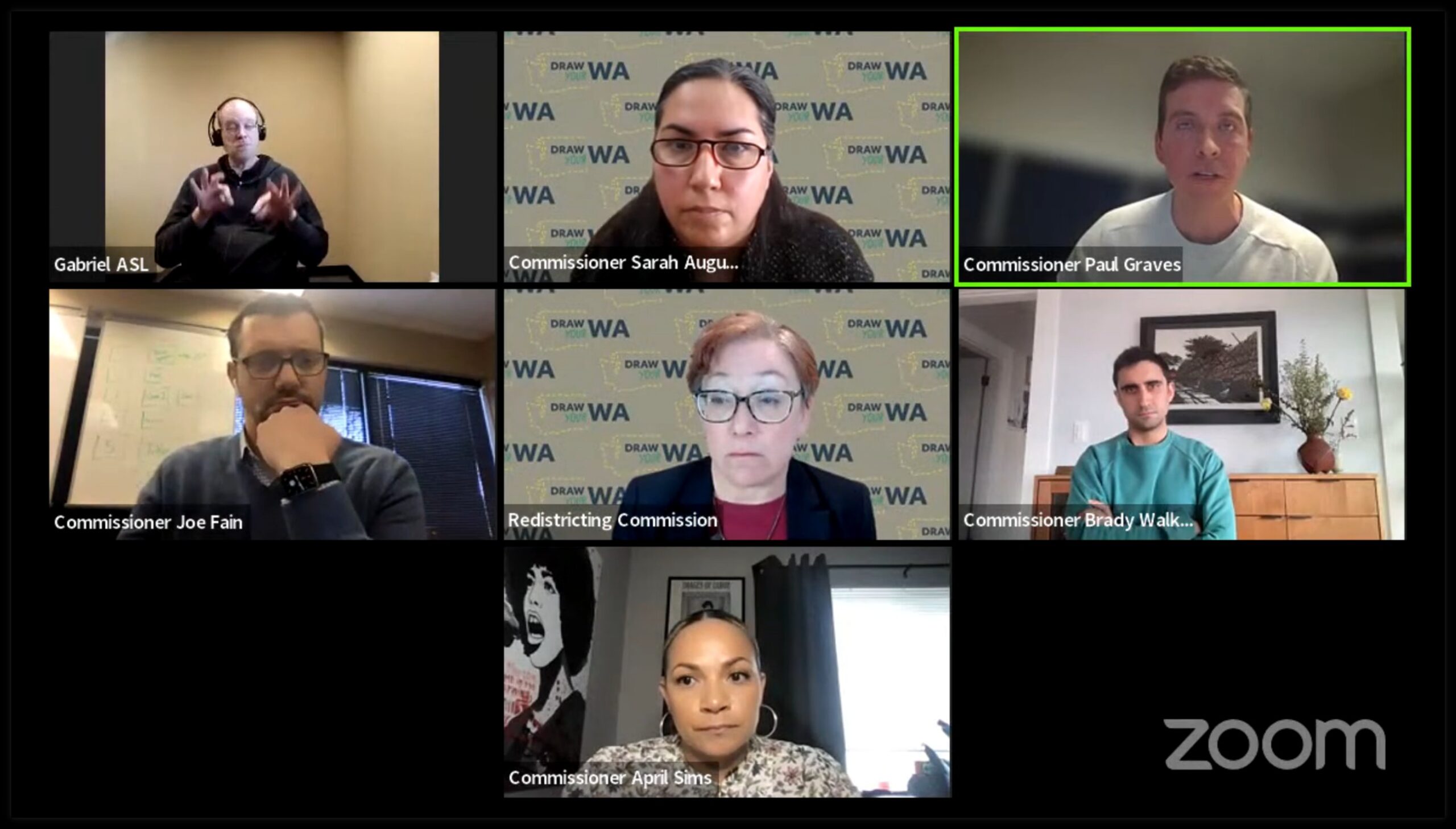The 2021 Washington State Redistricting Commission continues to be a case study in how not to redraw a set of legislative and congressional boundaries.
At its latest meeting, the four member commission, which is evenly divided between Democrats and Republicans — lost its nonvoting chair, Sarah Augustine, while the commissioners deadlocked on responding to a federal lawsuit that alleges the Voting Rights Act wasn’t followed when the new maps were drawn.
“While I hope my presence on the commission for the past thirteen months has contributed to our shared work, now that the primary drivers of the process are external to the commission, I believe my role is no longer relevant. In addition to this concern, I must recuse myself from further participation because of the centrality of my community to current litigation,” Augustine said in a statement.
She also lamented that Secretary of State Steve Hobbs, Senate Majority Leader Andy Billig, and House Speaker Laurie Jinkins — all Democrats — have declined to defend the Redistricting Commission’s work product against a federal lawsuit filed by the Southcentral Coalition of People of Color for Redistricting, even though the Legislature voted to adopt the Commission’s work product last month with minor and technical changes by a two-thirds vote of each chamber.
(Hobbs, Jinkins, and Billig are the named defendants in the case.)
“By failing to defend the redistricting plans agreed to by consensus, state authorities have chosen to undermine the process and dismiss the compromises undertaken in the public interest,” Augustine said.
That is a curious statement, given that the Redistricting Commission itself flouted Washington’s open meeting laws and failed to get its work done by the constitutionally mandated deadline. For a brief period, commissioners tried to pretend that they had succeeded when they hadn’t, eventually realized that wasn’t going to work, and then informed the Supreme Court of their failure.
A few weeks later, the Supreme Court inexplicably and irresponsibly threw the hot potato back into their hands and said it wasn’t going to get involved, even though the Constitution requires the Court to take over map-drawing responsibilities in the event of a failure by the commission to get its work done on time.
It is also a curious statement given that the Commission itself could not reach a consensus on defending its own work product. As the statement released by the Commission goes on to admit: “In a 2–2 vote, Commissioners split on the decision to have the Commission intervene in the lawsuit, essentially deciding not to intervene. The initial hearing on the lawsuit in U.S. District Court is on March 25th, where the presiding judge will entertain a motion for a preliminary injunction against using the new maps until the case is decided.”
The compromises the commission agreed to last year were undertaken in the interest of the Legislature’s four caucuses, who are primarily interested in incumbent protection, not the public interest. Our team doesn’t know anyone who has been following the redistricting saga who would agree with Augustine’s characterization. How can something possibly be defended as being in the public interest when the public was excluded from the deliberations and denied the opportunity to provide any comment or input on the final maps?
And since November, the Commission has continued to shun public input.
Every meeting of the Commission since the November imbroglio has been closed to public comment. Notices sent out with each meeting announcement have said:
There will NOT be a public comment portion of this meeting.
That’s nine consecutive public meetings, counting November 15th, with no public comment allowed or accepted. But sure, go on and insist that this process has involved “compromises undertaken in the public interest.”
Washington is hardly the only state struggling with redistricting this cycle, of course. But unlike swing states like Pennsylvania, which have clashing Republican legislative majorities and a Democratic governor and Democratic State Supreme Court majority, Washington has a Democratic statehouse trifecta.
Washington’s redistricting process would likely have gone better if the House and Senate had simply drawn the maps themselves, as happened in Oregon.
What is abundantly clear is that the bipartisan Four Corners controlled commission model is not serving Washington well. The state needs a constitutional amendment to overhaul how it draws congressional and legislative district maps.
An independent commission consisting of a panel with an odd number of voting members and representatives who aren’t chosen by the caucus leaders (like what California has) would be a far superior system for the 2031 cycle and beyond.

